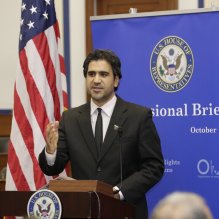International Dignitaries Rally for a New Iran Policy, Support NCRI as Democratic Alternative


By Dr. Majid Rafizadeh
Hard-line Iranian President Ebrahim Raisi, who is known as the “Butcher of Tehran,” should be held accountable for his crimes rather than given a platform to spread his propaganda.
According to human rights organizations, since Raisi took office last year, Iran has conducted a “horrific wave of executions” — an ominous accomplishment for a regime already recognized as having the world’s highest rate of executions per capita. In Raisi’s first 12 months as president, Tehran carried out more than 520 executions, far surpassing the total for 2021 (366) and 2020 (255).
In the meantime, the regime’s judiciary has implemented a number of barbaric sentences of corporal punishment, including the amputation of convicts’ fingers. Raisi himself issued a directive for stricter enforcement of “chastity and hijab” last month, allowing for more “Guidance Patrols” to harass and even assault women in public for allegedly flouting forced veiling laws. The death last week of 22-year old Mahsa Amini, who was in the custody of the regime’s morality police, has sparked outrage and protests
Efforts to reassert the regime’s hard-line ideology have also extended far beyond Iran’s borders. The US Department of Justice last month unsealed its case against a member of the Islamic Revolutionary Guard Corps, who had been observed actively attempting to facilitate the assassination of former National Security Adviser John Bolton on US soil. It appears that the known activities of this member of the IRGC date back to only two months after Raisi was sworn in as president.
Assassination plots against Bolton and former Secretary of State Mike Pompeo are examples of Tehran’s escalating brazenness. And those individual threats are dwarfed by others that have been directed against entire communities, like that of Ashraf 3, the Albanian residence of about 3,000 expatriate dissidents affiliated with the leading pro-democracy opposition group, the National Council of Resistance of Iran.
In July, the NCRI was urged to cancel a planned rally at Ashraf 3 after Albanian authorities revealed there had been credible terrorist threats made against it. That revelation coincided with a number of arrests of Albanian residents who were believed to be conspiring with the Iranian regime. The arrests were the culmination of a four-year investigation that evidently grew out of the prior disruption of a bomb plot targeting the same community in 2018. Later that same year, Iranian intelligence operatives were also thwarted in a similar attempt to bomb an international gathering near Paris that had been organized by the NCRI.
Those earlier plots most likely highlight the very reason why Raisi was designated by Supreme Leader Ali Khamenei to take over the presidency. The hard-liner’s promotion came in the wake of a series of nationwide anti-government uprisings, in which the opposition played a leading role, according to Khamenei himself.
Raisi has historically played significant roles in violent crackdowns on the democratic opposition. He was one of four officials to serve on the Tehran “death commission” that interrogated political detainees at the Tehran and Gohardasht prisons during the summer of 1988. This was to execute a religious decree, or fatwa, issued by the regime’s founder, Ayatollah Khomeini, which accused political opponents of “waging war on God.” Khomeini ordered that “those who are making the decisions must not hesitate, nor show any doubt or be concerned with details,” when executing members of the opposition.
Over the course of about three months in 1988, the regime executed about 30,000 political prisoners, at least 90 percent of whom were sympathizers of the NCRI. No one was held accountable for any of the killings until 2019, when Swedish authorities arrested a former Iranian prison official named Hamid Noury. He was this year handed a life sentence for crimes against humanity. The international community’s prior inaction in the face of countless testimonials about the massacre seems to have provided the Iranian regime with an abiding sense of impunity in matters related to human rights.
Western powers have not shown any interest in formally investigating the massacre, much less demanding accountability for higher-level officials. But many of these officials hold their senior positions precisely because of the actions they took to suppress dissent in the 1980s. Raisi is a prime example.
By giving the Iranian president the platform to spread his propaganda, the UN and, by extension, the US are legitimizing the regime’s practice of lionizing human rights abusers. Furthermore, this will reinvigorate the sense of impunity enjoyed by the Raisi administration and the regime as a whole. The UN and the US ought to condemn the actions of Raisi, both while on the death commission and as president, and make it clear that he should be held accountable.

• Dr. Majid Rafizadeh is a Harvard-educated Iranian-American political scientist. Twitter: @Dr_Rafizadeh
This article was first published by arabnews
Join us on YouTube:
Iran Panorama
Comments
Post a Comment